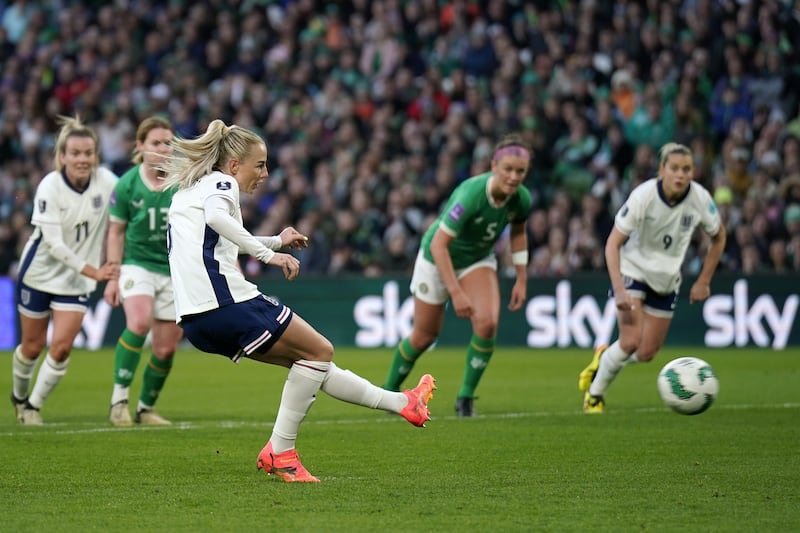Kerry Davis, the first black woman to play football for England, hopes “brilliant” forward Lauren James will never let racist abuse stop her from stepping into a well-earned spotlight.
Like other trailblazers, Davis has attracted renewed attention in the wake of England’s Euro 2022 triumph and a corresponding run of overdue recognition, from her induction two years ago into the National Football Museum’s Hall of Fame to receiving, in March, Football Black List’s Keith Alexander Award for outstanding contributions to the game and community.
James has emerged as one of Chelsea and England’s most dynamic talents, finishing joint runner-up in the Women’s Super League top-scorer charts this season and last summer scoring three times and adding as many assists in her maiden World Cup.
The 22-year-old is also a favourite target for online hate, including abuse in December that recently-departed Chelsea boss Emma Hayes revealed had left the WSL champions’ player of the season “not in a great place”.
⚽️ #Lionesses goal scorers past and present.
Happy birthday, Kerry Davis! 🤝 pic.twitter.com/VJhL8igf9Q
— Lionesses (@Lionesses) August 2, 2023
“Going on social media is super brave,” Davis, who like James is of mixed ethnic heritage, told the PA news agency.
“For example, the Black List awards, somebody put a comment, ‘She’s not black’. First of all, I took it in and I absorbed it and I thought, ‘You can’t tell me how I identify’. I just thought, ‘You just get on with your nonsense’.
“I think Lauren James is a fabulous player and when you’re brilliant at something, that’s what people do to try to knock you down. She just needs to keep doing what she’s doing.
“Those people who criticise don’t know her. From what I’ve seen, she’s a good person and a fabulous player, but she’s also young. We learn every day, don’t we?”
🙌 Introducing the latest recipient of the Keith Alexander Award – Kerry Davis! 🥇
⚽️ Kerry Davis made history as the first Black woman to represent England, and she showcased her talent as a forward for renowned clubs like Liverpool and Napoli throughout her career! pic.twitter.com/gparaw7vLM
— Football Black List (@FootieBlackList) March 22, 2024
On Thursday, Davis, 61, was honoured with the lifetime achievement award at the Women’s Football Awards in London.
Davis made her England debut in 1982 and went on to earn 82 caps, scoring 44 goals before her 1998 retirement.
She was the Lionesses’ top goal-scorer until Kelly Smith broke the record in 2012, surpassed nine years later by Ellen White.
The former forward started out at ERF Sandbach, where she played for six years before she was scouted by Crewe, and made her senior international debut against Northern Ireland in UEFA’s first competition for women’s football.
She went on to feature in England’s first World Cup, in 1995, and four European championships, including the 1984 final against eventual winners Sweden at Kenilworth road where, Davis remembers, “it rained all night and all day and the pitch was like a bog. We never thought the match would go ahead.”
Lovely to see Kerry Davis inducted to the Hall of Fame @FootballMuseum #Lioness #legend pic.twitter.com/03M2W8mR8x
— Professor Jean Williams – Femorabilia @jeanolafc (@JeanMWilliams) November 10, 2022
Davis is as invested in preserving history as she is in making it.
She has joined up with the National Football Museum on a project diving into the legacy of the black community in football, working with a group that includes ex-England boss Hope Powell, Peckham Town manager Mary Phillip – the Lionesses’ first black captain – and Euro 2022 winner Nikita Parris.
Asked about what remains a patchy early record of the English women’s game, with even the whereabouts some of the first major trophies still unknown, Davis said: “A lot is being done now, but to me it should have been done a long time ago.
“I think it’s really important that players of the past should be acknowledged and I think most players of my generation are pretty disappointed that records have been lost.”
Gone now are the days when even the country’s best female players received just two standard-issue shirts – one short sleeved and one long – and had to raise funds for their kits and travel, a trailblazing era that once saw Davis face a talented Dutch footballer named Sarina Wiegman, now the England manager, in a European qualifier.
And, while she agrees the elite women’s game today is “unrecognisable” from her playing days, Davis – unlike some players of her generation – insists that even back then it was not impossible to envision what it would become.
She added: “It was my dream and my dreams have come true.”








